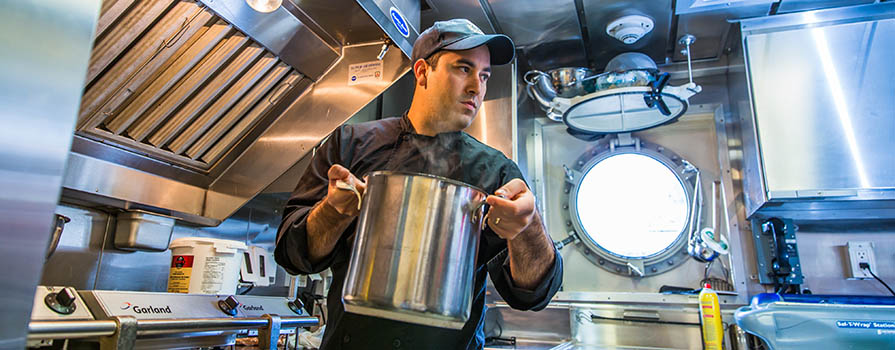Chef at sea

From working in the modern kitchen of one of Halifax’s most prestigious restaurants, to preparing dinner for a crew of search and rescue professionals on high seas, Brent Coutinho says that his culinary education has taken him to places he never dreamed possible.
“You never know when you’re going to be tasked to a search and rescue call,” says Brent. “I've been on a few; one to tow a ship that had lost power, and on another, a few kids were playing in an inflatable boat and were blown out to sea. We’ve also escorted fishing vessels to shore for engaging in illegal activity.”
Brent is Chief Cook aboard the Canadian Coast Guard’s mid-shore patrol vessel, the 140-foot Corporal McLaren M.M.V., currently in re-fit in Dartmouth. He is responsible for preparing three meals each day for the crew as well as desserts and snacks. Brent also oversees the operation of the kitchen, and ensures the mess area and food stores are clean and sanitary.
“I've always had a fascination with the water but I began my career as a prep cook and then sous chef and head chef on land,” says Brent who had not been to sea prior to joining the Coast Guard.
While the environment has changed, Brent says that the skills he learned at Kingstec Campus serve him well no matter what kitchen he is in. “I learned all my cooking basics at NSCC, and I’ve built on them ever since. From knife skills and butchering to baking skills and the five mother sauces, it’s where I turned my love of cooking into a career.”
The weather can make things challenging. When the seas are rough and the ship is bouncing around, you have to simplify the menu. Everyone has to eat, but you need one hand free just to brace yourself.
Ship life
Brent says that there is a strong connection between good food and good morale aboard the ship. “Being away from family can be hard for the crew, so putting their favourite food on the table can help them feel at home. I make a lot of comfort food.”
He adds that this is true for him, too. “When I applied to the Coast Guard, my wife and I had just started a family. It was important for me to have a career that would have me home at night to tuck my girls into bed.”
Most Canadian Coast Guard vessels operate on a rotational crewing system. For Brent, this means 14 days on shift and 14 days off. “It is a long stretch away, but I’m still home more time now than I was before. It would be next to impossible to find a schedule like this in the restaurant industry. It’s a big perk of the job.”
With three years in the Canadian Coast Guard, Brent says that he still misses the chaos and energy of restaurant kitchens from time to time; however, the latitude he’s given to prepare his ship’s menus means he’s able experiment and infuse his own creativity into each dish — a skill he says he was encouraged to developed at NSCC.
“It’s certainly different, but I enjoy that I'm the only cook aboard the vessel,” says Brent. “By working with the crew, and their many different preferences, I’m constantly challenged to stay creative and improve my skills as a chef.”
Fast Fact
The Canadian Coast Guard’s mid-shore patrol vessels conduct surveillance of fisheries operations; seize, recover, store and transport illegal fishing gear; and monitor the oceans to discourage smuggling and fish poaching.

